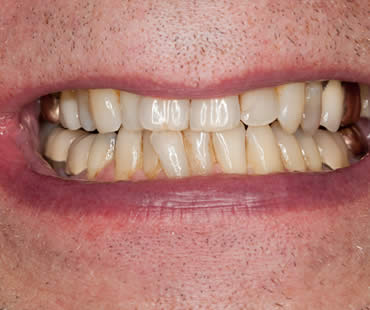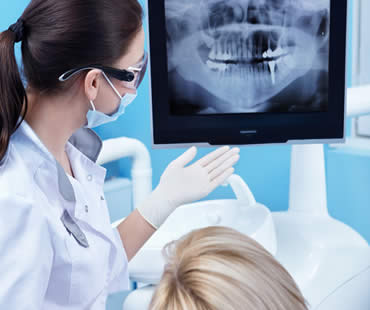
There is no quicker or easier way to dramatically improve the look of your smile than professional teeth whitening. Your dentist probably offers several whitening options and can advise you about the most appropriate type of whitening treatment to ensure your brightest, whitest smile. No matter which whitening treatment you and your dentist decide will be best, there are several tips you can follow to help you achieve the ideal result:
- Have any existing dental problems treated prior to whitening to avoid side effects or complications.
- Schedule a professional teeth cleaning prior to your whitening appointment to remove buildup of plaque or tartar you cannot remove with home cleaning, and provide the best surface for the whitening treatment.
- Begin brushing with a desensitizing toothpaste several weeks before whitening to limit the sensitivity that can sometimes result from whitening agents.
- If you are extremely prone to dental sensitivity, check with your dentist about taking a painkilling medication before your whitening appointment.
- Consult with your dental office to determine how much time you should allow for your whitening appointment.
- Refrain from eating or drinking anything except water for at least one hour after the completion of your whitening treatment, and avoid ingesting foods and beverages that contain stain-causing agents for no less than 24 hours.
- Make sure to attend any follow-up appointments with your dentist.
- Maintain excellent home oral care habits to extend the life of your whitening procedure.
By following these tips, you can boost the results of your professional teeth whitening treatment and face the world with beautiful, bright smile!
Our dental office is located in Sicklerville

If your teen is scheduled to have wisdom teeth extraction surgery, you might be feeling stressed-out about the procedure and how you can best prepare for what’s to come. Surgery can be frightening. As the adult, it’s your role to get the information you need and to educate and calm your teen so that you both have a feeling of confidence and safety during all steps of the oral surgery.
Don’t mislead your teen about the procedure or recovery time. Talk about the reasons the wisdom teeth need to be extracted; be honest about the issues. Talk about the oral surgeon and his or her qualifications and why this particular surgeon was chosen. Help give your teen a sense of trust in the surgeon, to help calm his or her nerves.
Listen to everything your child has to say regarding the surgery. Validate all your child’s feelings and statements and offer any guidance you can from your own life’s experiences. Be open to allowing a conversation between the surgeon and your teen. Your oral surgeon has experience in dealing with fearful patients and can often remedy fearful thoughts and feelings more efficiently than a parent.
Reassure your child that you won’t be far away during or after the procedure. Even though your teen may be already in college, surgical procedures can be frightening and you might be surprised at how much your teen may lean on you, emotionally and physically during this time.
Answer any of your child’s questions honestly. Go over any parts of the surgery that are confusing to your teen. This knowledge can restore a sense of control to the patient, and allow the patient to feel prepared to recover.
Your teen’s oral maxillofacial surgeon wants your teen to be comfortable during the surgery. Sedation dentistry options may be offered as early as the night before, so that the patient can be well-rested and calm for the procedure.
Schedule your appointment at our Sicklerville dental office

One of the most popular treatments in cosmetic dentistry is veneers. These thin shells made of porcelain or composite resin are bonded to the fronts of your teeth to hide the flaws of your real teeth. They look natural, resist stains, and are a durable way to restore smiles. Veneers offer a solution for patients with a variety of dental problems.
Fractured teeth:
Teeth that are broken or chipped can be hidden behind veneers, fully restoring your smile.
Discolored teeth:
Stained or yellowed teeth may result from a number of things. Some discoloration such as from foods or age can be improved with teeth whitening treatments. However, stains resulting from things like drugs, large resin fillings, or too much fluoride may not respond to whitening methods. Veneers provide the ability to choose the shade of white you like and get your bright smile back.
Small teeth:
Sometimes teeth are just too small for a person’s facial features. It is difficult for orthodontists to close gaps between teeth that are too small, and gum recession is also often an issue with small teeth. Veneers can take care of both of these problems.
Worn teeth:
When the edges of teeth become worn, it can make you look older than you actually are. Veneers can lengthen teeth that are shortened with wear so that your smile looks brand new.
Crooked teeth:
Misaligned and crooked teeth can be hidden under dental veneers. This gives your smile a uniform and appealing look.
Cosmetic issues:
Veneers can be provided simply for cosmetic purposes to change the shape and appearance of your teeth. You and your cosmetic dentist can design the veneers together so that your teeth might look more curved, flatter, bigger, or longer as you choose.
If you need a dentist in Sicklerville contact us today

Plaque is your mouth’s enemy. It is a film of bacteria that forms on your teeth, and produces acid as it mixes with sugar from foods and drinks you consume. Over time, these acids destroy your tooth enamel and lead to decay. Plaque can also form under your gums and affect both the gum tissue and the bones supporting your teeth.
So how can you avoid getting the plaque that causes these problems? Here are some helpful tips.
Brush
Use a fluoride toothpaste to brush your teeth at least twice a day. Choose a soft-bristled toothbrush and brush all of your tooth surfaces, as well as your tongue.
Floss
As much as many people don’t want to, flossing your teeth every day is important in getting rid of plaque between your teeth and at your gum line.
Eat healthy foods
Some foods help keep plaque off your teeth. Munch on apples, cucumbers, carrots, and other raw vegetables and fruits. Crunchy foods like these will help clean your teeth while filling you up and giving you helpful nutrients.
Avoid junk food
On the other hand, limit the amount of junk food that you eat. Sugary drinks and foods introduce sugar into your mouth that will stick to your teeth and lead to plaque formation.
See your dentist
Even if you practice good oral hygiene, some amount of plaque usually forms. It hardens to become tartar, which can only be properly removed by your dentist. Dental checkups every six months will help you keep plaque under control, and a healthy smile on your face.
Our dental office is located in Sicklerville

Wisdom teeth are the third set of molars and the last adult teeth to erupt into the mouth. Most people have four wisdom teeth, two on the bottom and two on top. Many people do not have enough room for these molars to emerge completely, causing them to become impacted in the gum. Impacted wisdom teeth are difficult to clean, making them more susceptible to decay and disease. Other dental problems caused by impacted wisdom teeth include pain, damage to surrounding teeth, and bite alignment issues. For these reasons, your dentist may recommend having the impacted teeth removed to prevent future problems.
Surgery to extract an impacted wisdom tooth or set of wisdom teeth is usually an outpatient procedure done in your dentist or oral surgeon’s office. If the tooth or surrounding area are deemed to have an infection prior to the procedure, surgery will be delayed, and your dental professional will likely prescribe antibiotics to help heal the area.
On the day of surgery, local anesthesia will be administered to numb the area where the extracted tooth will be removed. Depending on the severity of your case, your dentist or oral surgeon may also utilize a general anesthetic.
Once the anesthesia has taken effect, an incision will be made to open up the gum and any bone blocking the tooth will be removed. Your dentist or surgeon will then separate the tissue connecting the bone to the tooth and extract the tooth. Some teeth are too large to remove in one piece, in which case your surgeon will cut the tooth into smaller pieces to make it easier to remove. Finally, the incision is closed with stitches and packed with gauze to help alleviate bleeding.
Long-term complications from impacted wisdom tooth surgery are rare. To ensure a successful recovery from this or any oral surgery, be sure to follow all aftercare instructions provided by your dentist or oral surgeon.
We treat patients from Sicklerville and the surrounding area

What is a dental crown?
- A dental crown encases a damaged tooth completely within a custom-fit cap, or crown, fitting perfectly over the affected tooth. A dental crown is designed specifically for you and your tooth’s particular design, fit and function. It is a restorative therapy that can restore function to a tooth that may have had excessive decay, has been cracked or has recently undergone root canal treatment.
How do dental crowns work?
- A dental crown covers a damaged tooth entirely and can be used to improve not only the tooth’s appearance, but also its shape or alignment.
What is a dental bridge?
- A dental bridge makes a literal bridge between two anchor teeth, filling a gap left by a missing tooth that has either fallen out naturally or is the result of acute decay or facial trauma. Dental crowns cover the bordering anchor teeth, allowing the bridge to fit securely and to function as your natural tooth.
What materials are used for dental crowns?
- Dental crowns can be porcelain (ceramic), porcelain-fused-to-metal, or gold or other metal alloy. Porcelain or ceramic crowns can be designed to closely match the color and translucency of your natural teeth. Metal alloys are usually stronger, and are a better choice for back teeth.
Is a dental cap a crown?
- Yes! A dental cap is another name for a dental crown.
Am I a candidate for a dental bridge?
- If you are missing a tooth and you have adjacent teeth that are stable, dental bridges are for you. Even if you are missing a front tooth or a tooth that has only one border, there are types of dental bridges that could meet your needs.
Are there alternatives to a dental bridge?
- Dental implants are rising in popularity as technology has improved. A dental implant can restore a single tooth or can restore several, and are the standard of care for the replacement of a missing tooth today. Because a dental implant continues to stimulate the jawbone, it doesn’t lead to bone loss over time.
If you live in the Sicklerville area contact us today












